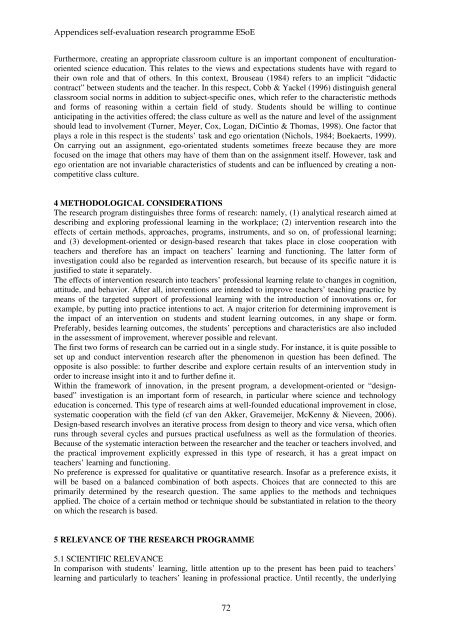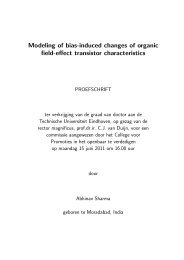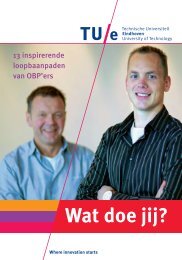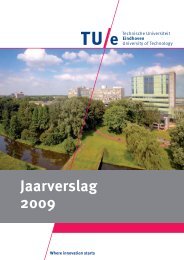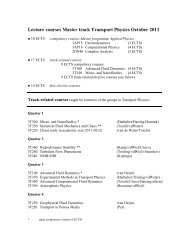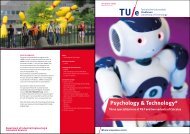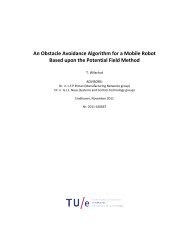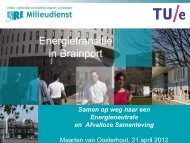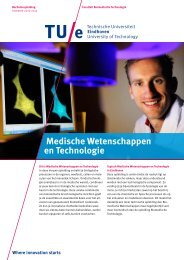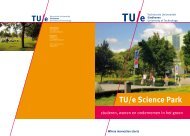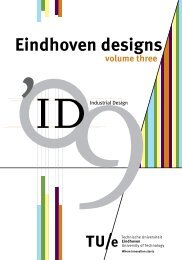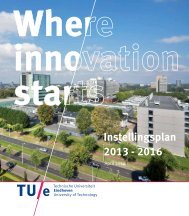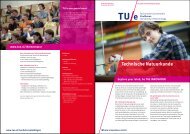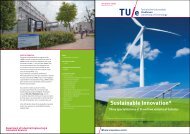Self-evaluation - Technische Universiteit Eindhoven
Self-evaluation - Technische Universiteit Eindhoven
Self-evaluation - Technische Universiteit Eindhoven
Create successful ePaper yourself
Turn your PDF publications into a flip-book with our unique Google optimized e-Paper software.
Appendices self-<strong>evaluation</strong> research programme ESoE<br />
Furthermore, creating an appropriate classroom culture is an important component of enculturationoriented<br />
science education. This relates to the views and expectations students have with regard to<br />
their own role and that of others. In this context, Brouseau (1984) refers to an implicit “didactic<br />
contract” between students and the teacher. In this respect, Cobb & Yackel (1996) distinguish general<br />
classroom social norms in addition to subject-specific ones, which refer to the characteristic methods<br />
and forms of reasoning within a certain field of study. Students should be willing to continue<br />
anticipating in the activities offered; the class culture as well as the nature and level of the assignment<br />
should lead to involvement (Turner, Meyer, Cox, Logan, DiCintio & Thomas, 1998). One factor that<br />
plays a role in this respect is the students’ task and ego orientation (Nichols, 1984; Boekaerts, 1999).<br />
On carrying out an assignment, ego-orientated students sometimes freeze because they are more<br />
focused on the image that others may have of them than on the assignment itself. However, task and<br />
ego orientation are not invariable characteristics of students and can be influenced by creating a noncompetitive<br />
class culture.<br />
4 METHODOLOGICAL CONSIDERATIONS<br />
The research program distinguishes three forms of research: namely, (1) analytical research aimed at<br />
describing and exploring professional learning in the workplace; (2) intervention research into the<br />
effects of certain methods, approaches, programs, instruments, and so on, of professional learning;<br />
and (3) development-oriented or design-based research that takes place in close cooperation with<br />
teachers and therefore has an impact on teachers’ learning and functioning. The latter form of<br />
investigation could also be regarded as intervention research, but because of its specific nature it is<br />
justified to state it separately.<br />
The effects of intervention research into teachers’ professional learning relate to changes in cognition,<br />
attitude, and behavior. After all, interventions are intended to improve teachers’ teaching practice by<br />
means of the targeted support of professional learning with the introduction of innovations or, for<br />
example, by putting into practice intentions to act. A major criterion for determining improvement is<br />
the impact of an intervention on students and student learning outcomes, in any shape or form.<br />
Preferably, besides learning outcomes, the students’ perceptions and characteristics are also included<br />
in the assessment of improvement, wherever possible and relevant.<br />
The first two forms of research can be carried out in a single study. For instance, it is quite possible to<br />
set up and conduct intervention research after the phenomenon in question has been defined. The<br />
opposite is also possible: to further describe and explore certain results of an intervention study in<br />
order to increase insight into it and to further define it.<br />
Within the framework of innovation, in the present program, a development-oriented or “designbased”<br />
investigation is an important form of research, in particular where science and technology<br />
education is concerned. This type of research aims at well-founded educational improvement in close,<br />
systematic cooperation with the field (cf van den Akker, Gravemeijer, McKenny & Nieveen, 2006).<br />
Design-based research involves an iterative process from design to theory and vice versa, which often<br />
runs through several cycles and pursues practical usefulness as well as the formulation of theories.<br />
Because of the systematic interaction between the researcher and the teacher or teachers involved, and<br />
the practical improvement explicitly expressed in this type of research, it has a great impact on<br />
teachers’ learning and functioning.<br />
No preference is expressed for qualitative or quantitative research. Insofar as a preference exists, it<br />
will be based on a balanced combination of both aspects. Choices that are connected to this are<br />
primarily determined by the research question. The same applies to the methods and techniques<br />
applied. The choice of a certain method or technique should be substantiated in relation to the theory<br />
on which the research is based.<br />
5 RELEVANCE OF THE RESEARCH PROGRAMME<br />
5.1 SCIENTIFIC RELEVANCE<br />
In comparison with students’ learning, little attention up to the present has been paid to teachers’<br />
learning and particularly to teachers’ leaning in professional practice. Until recently, the underlying<br />
72


